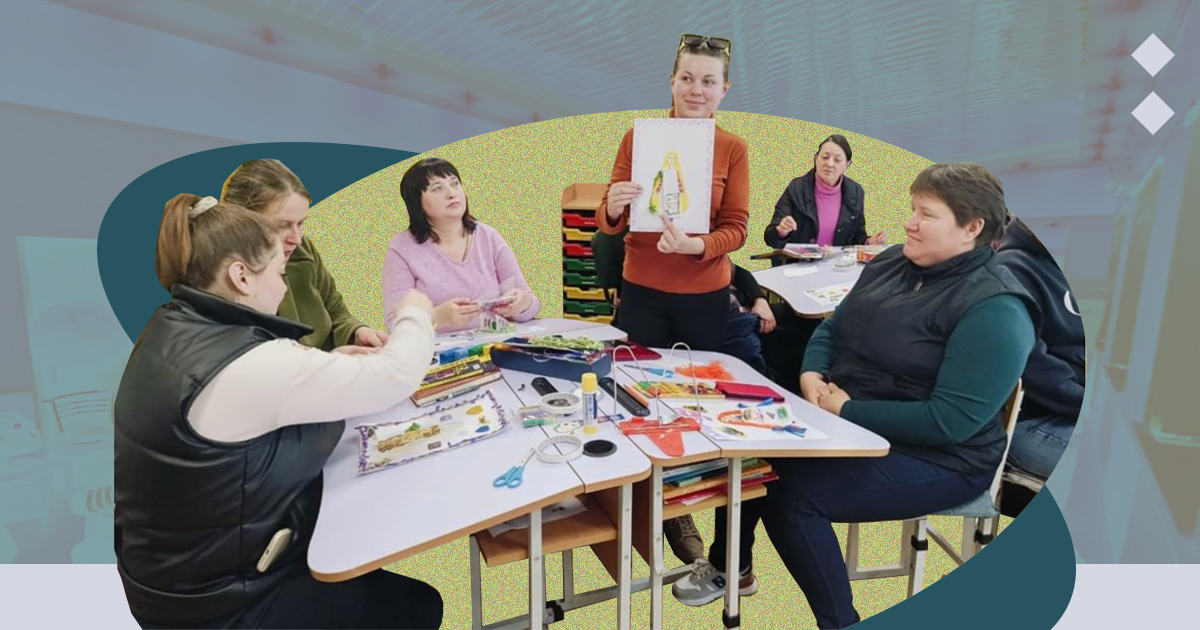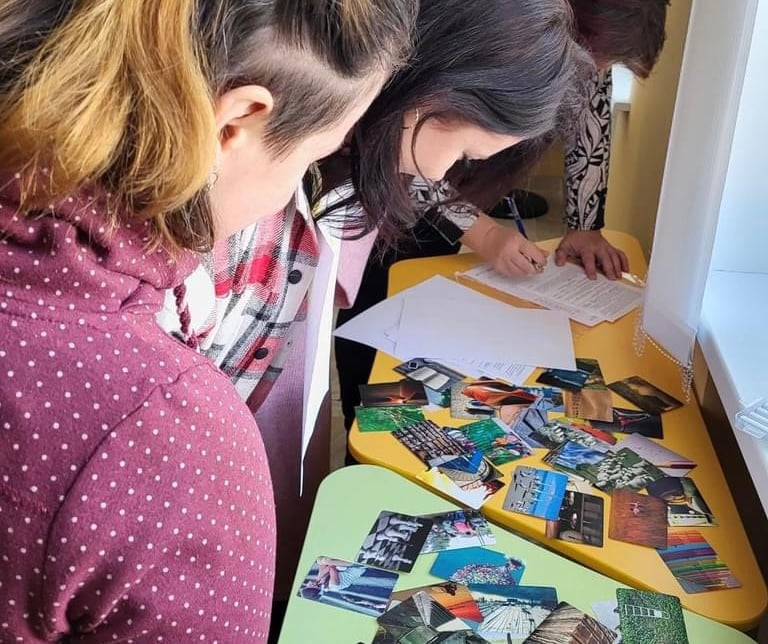"Station: Me" is a support initiative designed for psychologists, teachers, and parents. Rubryka shares how this project helps prevent burnout among these key caregivers, who provide emotional and practical support to others.


Since the start of Russia's full-scale invasion, Ukrainians have faced unprecedented challenges, from the loss of loved ones and destruction of homes to forced displacement and ongoing stress. All of this takes place against a backdrop of constant fear and uncertainty. Among those most in need of psychological and emotional support are individuals working in professions centered on helping others. Despite their own struggles, these people—psychologists, teachers, and parents—continue to assist, support, and guide others.
The "Station: Me" project aims to strengthen the mental health of people working in "person-to-person" roles, helping them prevent burnout and restore their emotional resources. Active in the Sumy and Poltava regions, this initiative is supported by UNICEF and implemented by the non-governmental organization "The Centre of Psychological Help 'Confidence'," with funding from the Norwegian government.


Educators from the Myrhorod community's Center for Aesthetic Education attend a session titled "Resources for Life as the Foundation of Psychological Stability." This event is part of UNICEF's project "Station: Me."Photo from the project archive
The "Station: Me" initiative launched in May 2023 with the goal of providing psychological support to those who offer care and assistance to others. This includes parents, especially those raising children with special needs, as well as families with children under 18 who have lost a primary breadwinner. Additionally, professionals who support families—such as government employees, social service workers, healthcare providers, and educators—are also part of the program.
"If these people experience burnout—and they face enormous workloads daily—the support system for those who need help will weaken. Our primary goal is to prevent the burnout of specialists working with people and help them restore their emotional resources," says Nataliia Pylypenko, project manager, psychotherapist, art therapist, and member of the Ukrainian Union of Psychotherapists.
The idea for the project emerged at the start of Russia's full-scale invasion. Specialists from the "The Centre of Psychological Help 'Confidence'," led by its head Anastasiia Hrabovyk, quickly acted to create the initiative. Initially, 15 specialists were involved, but within a year, the project grew to nearly 100 highly qualified psychologists, psychotherapists, and psychiatrists, all working to help Ukrainians maintain their mental health.
Today, the "Station: Me" project offers both online and in-person services across the Poltava and Sumy regions, including cities such as Sumy, Lebedyn, Trostyanka, Okhtyrka, Romny, Konotop, Shostka, Poltava, Myrhorod, and Kremenchuk.
Meeting on "Gender Socialization. Prevention of Professional Burnout" with teachers from Preschool Education Institution No. 7 "Yablunka" (Myrhorod). Photo from the project archive
According to the "Station: Me" project, those in people-focused professions are often driven by a desire to make the world a better place. Despite experiencing fatigue, they tend to "give" more than they "take"—offering their time, energy, and resources to others. This is why it's crucial for them to prioritize their own mental health, focusing on its preservation and recovery. Learning techniques to restore emotional resources and build psychological resilience is essential for long-term well-being.
Project experts emphasize that stopping to "breathe out" before reaching the point of total exhaustion is a key step toward recovery. Even if it seems like there's no immediate reason to pause, doing so is vital for preventing burnout.
"Many people mistakenly believe that stopping is a step backward, a halt in progress. But that's not the case. Pausing is a reset, a chance to reflect, understand, and feel. And sometimes, it's simply a moment to relax. Every day we make choices, and stopping is also a solution—often the best and most necessary one at that moment," says Yuliia Lazarenko, a consultant psychologist specializing in positive psychotherapy and art-hibuki therapy.
Lazarenko and her colleagues teach participants in the "Station: Me" project how to maintain balance between what they "want," what they "can," and what they "must" do. They encourage avoiding extremes, listening to oneself more often, and setting priorities carefully—evaluating personal capabilities and time while helping others.
Lyudmyla Kunyeva recently held a meeting titled "Resources for Life as the Basis of Psychological Stability" with teachers from the Myrhorod community. Photo from the project archive
"In our fast-paced, often overwhelming lives, teachers may overlook the gradual depletion of their energy and the waning of their enthusiasm for working with children. It's crucial to focus on personal recovery during these times, seeking the strength and resources needed for effective work, as well as achieving physical recovery and emotional balance," emphasizes Lyudmyla Kunyeva, a psychologist with the "Station: me" project.
During these meetings, Kunyeva engages teachers in discussions about resourcefulness and the prevention of professional burnout. Participants explore the nuances of both personal and professional burnout, while also sharing their experiences and strategies for preventing burnout along their pedagogical journeys.
Training: "Anxiety. What to do with it and how to get rid of it?" for Specialists of Mykolayiv territorial community. Photo from the project archive
The training also addresses anxiety, a common negative emotion that many Ukrainians experience today. While anxiety is a normal reaction to stress, it can become overwhelming for some, significantly impacting their daily lives. During clinical psychologist Oksana Korsun's webinar, "Basic Skills of Caring for Oneself and Others," employees from educational, social, and medical institutions learn to identify their emotions, prevent stress, and acquire techniques for maintaining emotional stability.
Overall, the "Station: Me" project offers comprehensive support to participants, which includes individual consultations with psychologists, access to psychiatrists when needed, long-term assistance, group meetings, and both online and in-person sessions with psychologists and psychotherapists.
Master Class: "Image of My Inner Strength" for teaching staff of Staroavramivska school was conducted by specialists from the mobile psychological support team of the "Station: Me" project. Photo from the project archive
The project also includes mobile psychological teams that address the need for accessible mental health support, especially for individuals living in border areas. According to the project's head, this approach was developed to overcome the limitations in accessing psychological assistance in these regions.
Specialists from the United Nations Children's Fund (UNICEF) "Station: Me" project provided emergency psychological assistance to civilians in Poltava on September 3-4, 2024. The photo is from the project's archive
Mobile teams are designed for quick response. Recently, for example, in Poltava and Sumy, when Russian missiles bombarded the cities, project specialists worked at the civil defense headquarters, offering urgent psychological support to civilians and, at times, to critical infrastructure workers on-site.
"This work is very specific, as specialists must be ready to provide a full range of psychological services: quickly assess and address beneficiaries' needs, offer immediate psychological or crisis assistance, stabilization measures, or conduct a full consultation. They may also inform individuals about future professional help. Often, in moments of stress, words of encouragement, warm hugs, and simply the presence of a specialist can make a significant difference," the project team noted.
Group meeting with the teachers of Poltava Gymnasium No. 36. Photo from the project archive
"We understand the cause-and-effect relationships because we have learned from the experiences of other countries. By supporting educators, we support their students. By helping parents, we also help their children. When we support a child, we restore their confidence and encourage them to dream and create. This means we are helping to build a brighter future together. By assisting specialists, we create a much larger impact across entire sectors," says Pylypenko.
From June 2023 to May 2024, the project provided nearly 24,000 individual consultations for both children and adults, including long-term support. During the year, specialists conducted 975 group meetings, including 46 webinars for adults and 50 masterclasses for children. More than 5,000 people—both parents and specialists—participated in these events.
"We don't know how many challenges lie ahead, but we know exactly what our children and families need. That's why we consciously choose the path of recovery, to find strength and inspiration in these difficult times," said one project participant, reflecting on the work of "Station: Me."
Psychological support and recovery. Yoga during a retreat. Photo from the project archive
As part of the "Station: Me" project, retreats are organized as a form of support. Over the past year, nearly 100 professionals working with children participated in these retreats, helping them recover. According to Pylypenko, this approach is effective because it not only provides participants with new knowledge and skills but also helps them replenish their own resources—critical for preventing professional burnout. Through music and art therapy, physical and breathing exercises, and a safe environment, participants regain their psycho-emotional balance, and a sense of support and trust.
"I spent these days both pleasantly and productively. We are so burned out from the stressful conditions we work in, especially living near the border, that these meetings are as essential to us as oxygen! Only during these sessions do you realize how much we need the support of professional psychologists!" shared one retreat participant.
Another participant added: "Taking care of yourself and your psychological well-being in such challenging times is incredibly important. Thank you for reminding us of this and teaching us how to do it properly. When you're replenished, you can share that strength with others."
Such feedback motivates the team, says Pylypenko and adds: "The greatest reward is seeing the spark of hope or vitality reignite in someone's eyes. It's the moment when they rediscover the desire to live, create, and realize they have the strength to pursue their dreams, despite everything."
Music therapy class for IRC specialists and teachers of Konotop educational institutions. Photo from the project archive
In addition to its psychological focus, the project is implementing the WASH (Water, Sanitation, and Hygiene) program from May to December 2024. This initiative covers hygiene education on multiple levels: from informational and mental hygiene to general and menstrual hygiene. The project's founders believe that in wartime, when access to medical services may be limited, knowledge of basic hygiene practices should be integrated into psychological programs, highlighting the connection between physical and mental health.
Starting in June 2024, the project also launched classes for parents, including "Parenting without Stress" club meetings. These clubs help parents strengthen relationships with their children, develop positive parenting skills, and learn effective responses and strategies for interacting with their children.
Classes at the parents' club. Photo from the project archive
How does the team of psychologists and psychotherapists maintain their own mental health? Anastasia Hrabovyk explains that each team member works with their own psychotherapist. This allows them to process their thoughts and take care of themselves. Additionally, within the team, specialists consult with each other to provide the best support to their colleagues and those seeking help, always ensuring anonymity and confidentiality are upheld.
Натренований командою дослідників ШІ “роздивився” в уламках від російських обстрілів не сміття, а цілу низку… Читати більше
У лікарнях Харкова та Ужгорода студенти під наставництвом психологинь, менторів та супервізора проводять для дітей… Читати більше
У Лубнах фахівці, які допомагають військовим, вчилися будувати довірливий контакт із тваринами, зокрема кіньми та… Читати більше
Фізика — це про дослідження себе й світу. Саме так вважає Христина Гнатенко, українська науковиця… Читати більше
Міжнародне дослідження показало: в Україні кожна п’ята дитина віком 6-8 років має надлишкову масу тіла.… Читати більше
“Центр комунікації” Київської міської державної адміністрації позиціює себе як майданчик для розбудови партнерства та діалогу… Читати більше
Цей сайт використовує Cookies.